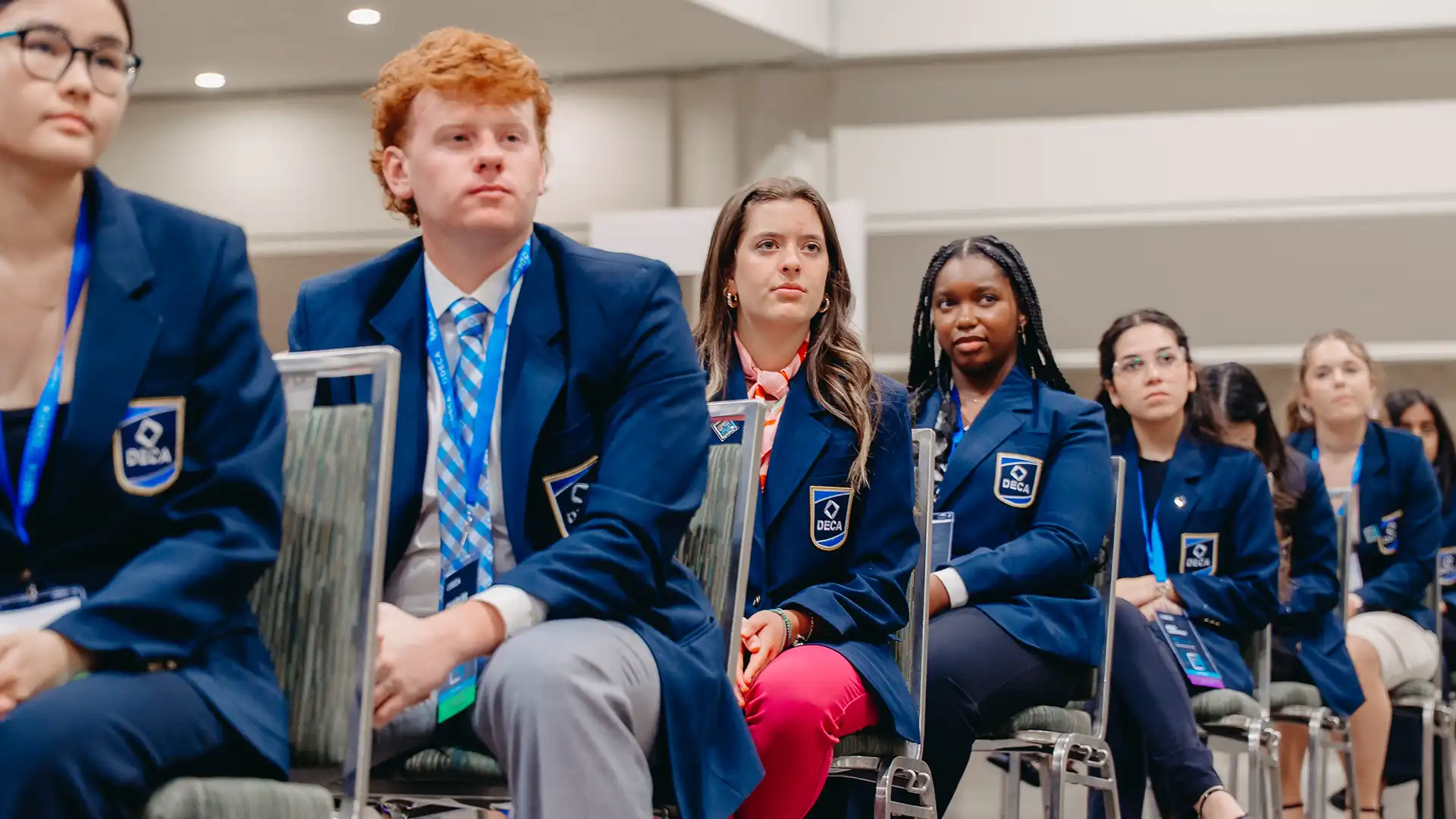DECA advisors are first and foremost, classroom teachers. DECA’s written and prepared events are used by advisors as authentic learning experiences to help students learn and develop skills outlined in the curriculum.
Combined, DECA’s written and prepared events and project-based learning (PBL) can support course curriculum, motivate and engage students.
Whatever form a project takes, it must have eight essential elements to meet the definition of project-based learning (Larmer, Ross, & Mergendollar, 2009):
- Significant Content – At its core, the project is focused on teaching students important knowledge and skills, derived from standards and key concepts at the heart of the academic content areas.
- 21st Century Skills – Students build skills valuable for today’s world, such as critical thinking/problem solving, collaboration, and communication, which are taught and assessed.
- In-depth Inquiry – Students are engaged in a rigorous, extended process of asking questions, using resources, and developing answers.
- Driving Question – Project work is focused by an open-ended question that students explore or that captures the task they are completing.
- Need to Know – Students see the need to gain knowledge, understand concepts, and apply skills in order to create project products, beginning with an Entry Event that generates interest and curiosity.
- Voice and Choice – Students are allowed to make some choices about the products to be created, how they work, and how they use their time, guided by the teacher and depending on age level and PBL experience.
- Revision and Reflection – The project includes processes for students to use feedback to consider additions and changes that lead to high-quality products, and think about what and how they are learning.
- Public Audience – Students present their work to other people, beyond their classmates and teacher.
With the proper planning, all essential elements of PBL can be addressed by using DECA’s written and prepared events in the classroom. Below is an example using DECA’s Business Operations Research Events.
DECA’s Business Operations Research Events
The business operations research events involve the preparation of a detailed plan based on the results of a research study. The participants must
- select an actual local business operation
- design a research study
- conduct a research study
- analyze the results of the research study
- prepare a detailed plan to improve an aspect of business operations
- prepare a proposed budget
- present in a role-play situation
- the design of the research study
- the findings and conclusions of the research study
- strategies to improve an aspect of business operations
- a proposed budget to enact the suggested strategies
Essential Element of PBL and how they are supported
- Significant Content - Students learn market research skills in the classroom and then apply the newly-acquired skills by conducting a research project in their community.
- 21st Century Skills - Critical thinking, problem solving, collaboration, creativity and communication skills are developed and reinforced throughout the research process. Students must develop real solutions to address real business problems as part of this event.
- In-depth Inquiry - Students conduct an actual research study in collaboration with a local business. Students create research instruments, analyze data, and draw conclusions based on findings.
- Driving Question - Each year there is a new driving question for the Business Operations Research Events. For 2014-2015, students are challenged to identify an underserved generational group and develop strategies to better serve this group of customers. Each project is likely to go in different directions based on the generational group that is identified as being underserved. Students will ask a variety of questions throughout the research process in order to draw conclusions and develop strategies to better serve the group of customers.
- Need to Know - Since students are working with a real business in their community, there is a genuine desire to help the local business owner/manager improve business operations. Students take the challenge seriously because their work will have an impact on an actual business.
- Voice and Choice - Students have voice and choice in how to conduct the research, how to interpret the data, and which improvement strategies to recommend. Teachers guide the process, but students make many of the decisions throughout the project.
- Revision and Reflection - Students are encouraged to revisit their work throughout the entire project and ask themselves what is working well, what is not working well, etc. Even after students have made recommendations to the local business owner, students should ask themselves if their contributions have made a positive impact on the business. Many teachers ask students to write reflection essays to conclude the project by providing prompts such as: (1) If you had the opportunity to conduct new research, what would you be looking for? (2) Would you utilize different research techniques? (3) Would you ask different questions?
- Public Audience - Several public audiences are involved in these projects. Students interact with actual store managers and owners, current customers, and potential customers.
From a Teacher’s Perspective
DECA staff interviewed several teachers to gain insight into how they utilize DECA’s competitive events in the classroom. Some of the themes that emerged during these conversations are:
- Using DECA’s written events in the classroom in conjunction with PBL makes a teacher’s life easier. DECA provides outlines general direction and writing outlines for students. Teachers just have to create timelines for the projects that work for them. DECA also provides rubrics which help teachers with assessing student work.
- DECA’s written events and PBL support both formative and summative assessment. Throughout the project students are self-assessing and improving their work. At the end of the project a business professional (volunteer judge) evaluates and scores the project.
- Students engaged in DECA’s written events and PBL take a lot of pride in their work. Because students are collaborating with real businesses in their community, they work harder because their input can really make a difference in the community.
- DECA’s written events and PBL help students apply knowledge and skills learned in the classroom in a real setting. Learning comes to life!
Project-based learning often energizes and excites students. DECA’s written and prepared events can help teachers engage students while teaching and reinforcing course curriculum. Incorporate DECA and PBL into your teaching plans this year and watch your students excitement levels rise!
References and Resources
- Boss, S. (2013). PBL for 21st Century Success: Teaching Critical Thinking, Collaboration, Communication, and Creativity. Novato, CA: Buck Institute for Education.
- DECA Inc. (2014). DECA Guide. Reston, VA: DECA Inc.
- Larmer, J., Ross, D., & Mergendollar, J. (2009). PBL Starter Kit: To-the-Point Advice, Tools and Tips for Your First Project in Middle or High School. Novato, CA: Buck Institute for Education.
- Laur, D. (2013). Authentic Learning Experiences: a real-world approach to project-based learning. Larchmont, NY: Eye on Education, Inc.



















